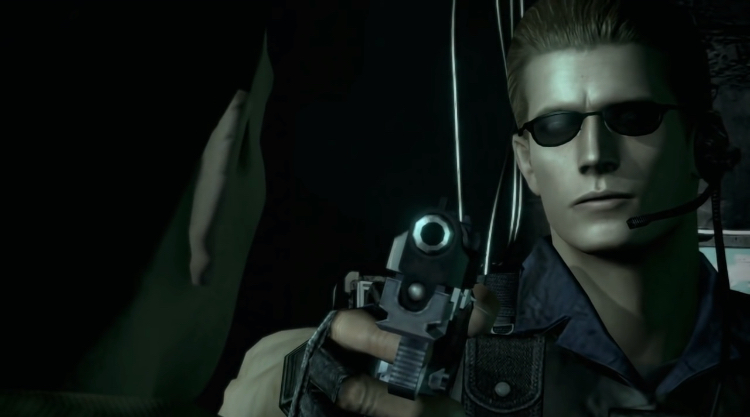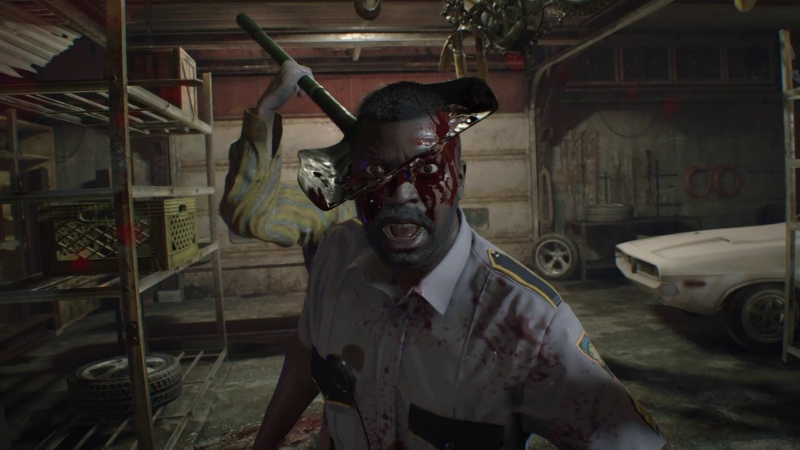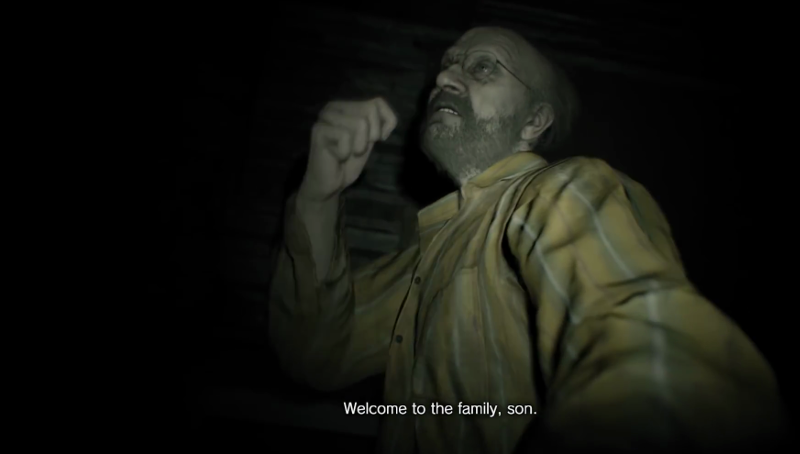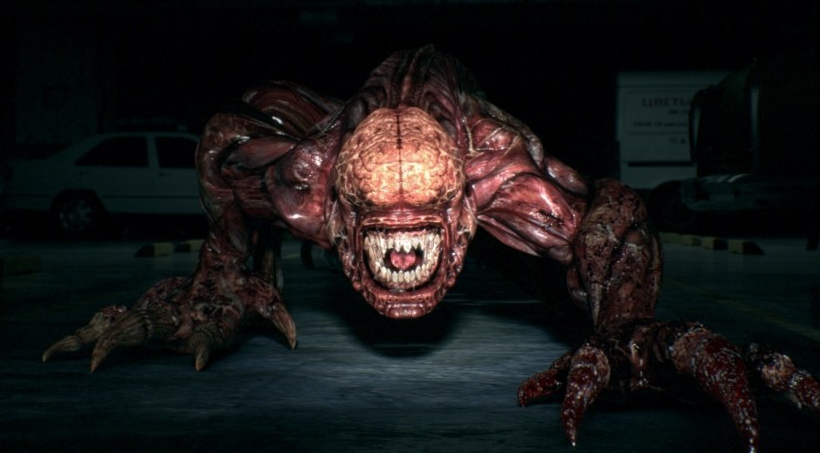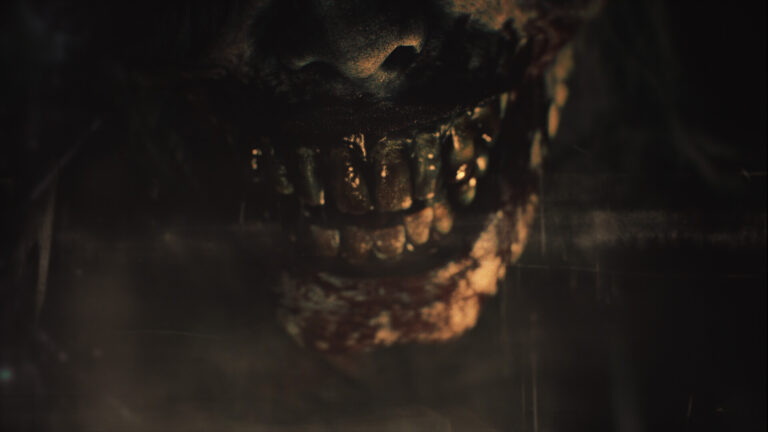Ever since the Resident Evil 7’s initial reveal, I immediately felt that something was off, and upon release I found many of my suspicions to be justified. Resident Evil 7 released almost two years ago to extremely wide praise. Many rejoiced that the franchise had finally abandoned the orgy of explosions and somersault kicks for a much more horror-focused experience closer to the franchise’s supposed roots. Having played through the game yet again two years later, I still can’t bring myself to enjoy the game. After the poor critical reception of the last handful of titles, there was a clear creative shift within Capcom to create a game with a much stronger focus on horror. Of course, I welcome the change in focus like nearly everyone else, yet I suspect that many non-problematic elements to the ‘RE-experience’ got added to the chopping block in Capcom’s quest for a scary RE game. While plenty of critiques of gameplay changes such as the shift to the first person have been made (critiques I don’t entirely agree or disagree with), for me, the de-emphasis on virus-mutant body horror, and the jarring shift in the writing’s tone standout as being particularly problematic and unnecessary changes, as the chip away at the uniqueness each game offers, leading to a much more bland and forgettable game.
Before you come after my head, let me say that Resident Evil 7 isn’t a ‘bad’ game. Overall the game was clearly competently made with a high level of production value — the item management and the puzzles stand out as being major highlights for me, and as I will explain later, there were moments of the game I actually enjoyed. However, none of this changes the fact that Resident Evil 7…I’m gonna say it…simply didn’t feel like Resident Evil, I dare say more so than the last handful of entries, yes even those ones.
Resident Evil has always been a somewhat tongue and cheek franchise. While I have enjoyed both the survival horror and action-oriented entries, I find it hard to not laugh alongside the series. Maybe they weren’t cliches at the time, but early RE games are filled to the brim with every zombie cliche imaginable. Haunted Mansion: check. Underground laboratory: check. Zombie virus: check. A Weyland-Yutani inspired evil mega-corporation responsible for everything: Absolutely. Add in a mustache-twirling Saturday morning cartoon villain into the mix and Resident Evil starts to seem a lot more whimsical. As the series would go on, the quirkiness of the franchise would evolve from every zombie cliche in the book mixed in with a healthy dose of awful voice acting, into a virus of the week soap opera, in which the same recurring cast would return each week to a new locale to fight new monsters and terrorism. Leon would become a shonen anime protagonist, Chris’ biceps were bigger than his head, someone would give a motivational speech about hope and freedom, then the Machiavellian mastermind would slip through everyone’s fingers, having escaped with another virus for next week’s episode.
I say the above elements are crucial to Resident Evil’s personality. An invisible essence of sorts, comprised of a series of elements, whether they be miscellaneous or not. Everything from the gameplay — to the music and art — and even the tone of a game’s writing all contribute to the uniqueness that the game provides, and all of the aforementioned are extremely important to what makes RE what it is. The greater effect of this is that the franchise is distinguished from other games despite sharing similar components (i.e a horde of bland zombie games). While many aspects of the franchise such as the gameplay and art direction are certainly vital contributors to RE’s individuality, the personality of the game’s writing as a ‘campy creature feature’ was a consistent component of the series through both the good and bad times, and removing it would be to completely overhaul the essence of what the series is. It would be like a Metal Gear game without the charm Hideo Kojima brought, or if Nier: Automata wasn’t directed by a memeable nihilist perv.
One can say, “Eh, this “personality” is all a product of bad writing, a cultural barrier between the East and West, and a company that was more concerned with following money than horror.” There is a kernel of truth in that statement. Much of what I mentioned can very easily be attributed to poor writing, and the chances of there being any deliberate decisions to achieve this phenomenon are slim to none. It’s easy to extrapolate that with the latest soft-reboot, the days of the horror-action series that wanted so badly to be seen as cool by its peers are over. Except, the game in question actually does retain trace amounts of this personality, RE7 didn’t completely abandon it, but that uniqueness that gave the series’ its identity was neglected and ignored, almost as though it was something to be ashamed of.
Unlike many other Capcom franchises, Devil May Cry, for example, RE7 is clearly afraid to have any actual fun and embrace its less serious — more video-gamey aspects. This ‘realistic’ approach the development team is seemingly in love with is demonstrated through the game’s non-existent soundtrack, dull color palette, grimy environments, and a protagonist incapable of running for more than five seconds. The decision to focus on the Bakers was also a likely attempt to create a more ‘real’ threat as opposed to the fantastical mutations (more on that later).
On the other hand, an example of the silliness I longed for can be seen in action is the early garage scene with Jack Baker, in which, the player repeatedly runs over Jack with a car like an injured deer that you want to put out of its misery. Shortly thereafter, the man then hops into the car with you so that he can then impale himself like a complete idiot. Better yet, the player later gets to enter a chainsaw-hedge trimmer boss battle with the southern caricature. If the game had consistently embraced and emulated the tone of these scenes (without neglecting the horror too much), then my criticisms would start to subside, and I would actually start to feel at home with RE7. However, once that camp starts to trickle in a little too heavily, just as things are getting fun, the shock collar around RE7’s neck goes off forcing it to adopt a more ‘grounded’ and ‘realistic’ experience that countless other horror games provide.
Since RE is supposed to be a horror franchise after all, it would make sense if one was skeptical of my desire for a more tacky story, but it should be noted that RE was never scary for its plot or characters. It’s not like RE stories were ever of the avant-garde ‘you were the monster all along’ variety. Classic RE games demonstrate that a cheesy narrative doesn’t necessarily negate an ominous or mysterious atmosphere. Nothing about having theatrical characters prohibits imposing and well-designed monsters or effective use of item management and combat mechanics.
Speaking of ‘having fun and personality’, it’s a little difficult to achieve these things without having an interesting cast, and few horror games have as colorful of a cast as RE. Resident Evil 4, the other franchise soft-reboot had the sassy pig-headed teenager, the suave womanizer, the femme fatale character, and the game’s protagonist, Leon, couldn’t help but make a joke at the expense of every monster he met, and while the handling of the game’s characters may have never been perfect, this wide array of character archetypes was retained in this massive shift for the franchise. Both RE4 and RE7 are mostly competent survival horror games, but the latter of which has one of the blandest casts to date, outclassed only by the first Revelations game exists (Go ahead and name as many characters from that game as you can. My record is 3. Jill and Chris don’t count.)
The protagonist, Ethan Winters, is mostly silent and unresponsive unless a cop refuses to give him a gun. To make matters worse, Mia and Zoe are also just as bland and shallow as they’re supposed to be ‘ordinary people’ because apparently ordinary people have nothing to say after finding and then killing their missing wife. RE may have never had deep and complex characters, but most of the time they weren’t the empty player-projection vehicles that plague countless games. You could argue the Bakers bring this colorfulness to RE7, but what they offer is simply not enough. Jack is really the only one that is successfully executed in this regard as Marguerite doesn’t really have anything interesting to say, and Lucas is mostly there for one puzzle. I do like Eveline however, as I too would sleep through most of the game if I could.
However, it isn’t just the approach to writing that makes RE7 feel alien to the franchise I’ve known, as the development team seemingly neglected the actual biological horror component of the RE experience, the series’ bread and butter. As I alluded to earlier, from the series’ very beginning, the games have always been somewhat of a ‘creature-feature’. The Umbrella monster of the week became a fundamental part of RE’s niche in the horror market. Fatal Frame had ghosts, Silent Hill had manifestations of your sexual repression, and RE was the one with zombies and test-tube monsters, and a part of each game’s appeal was whatever the new creations would be. I wasn’t particularly a fan of when RE4 decided to ditch zombies, but at least there were enough thematic parallels to justify the addition of the plagas, because at the end of the day RE4 will still about the horrors of human science gone wrong. The same can technically be said about RE7, but you’d be hard pressed to argue that the Bakers weren’t supposed to be the heart and soul of the game, and that heart and soul doesn’t thematically fit in with the rest of the franchises’ monsters.
For the people that actually found the Baker’s scary, they work because the player is trapped and isolated with a dysfunctional and psychotic cannibalistic take on the nuclear family. Until Marguerite turns into Spider-Woman, the family isn’t presented as biological monstrosities, and unfortunately those scenes are too short lived. Instant of a family of mutants with massive glowing eyeball arms–they’re presented as being merely unkillable crazies that shout bad memes in your face. This certainly has an appeal to people, but it’s a far cry from a franchise about the body horror of laboratory creations of ‘evil’ individuals attempting to play God.
Instead, for most of the game, a series of black fungus monsters called the “Molded” are the biological backbone. There are plenty of them in the game, which would seem like a good thing considering my stance, but there is a painful lack of variety among them. For most of the game, the player will fight countless numbers of these identical blob-men. Technically, there a couple variations, like a crawly one, and the big one, but needless to say this half-baked attempt at creature variety fails because their differences don’t translate into a unique enough experience. They all look practically the same, differences in their attacks are negligible, and they all die more or less the same way. This is the aspect of RE7 that is definitively the most ‘Resident Evil‘, and it’s the most lackluster rushed aspect of the game.
Since this game is supposed to be a return to the series’ roots, let’s compare that to the cast of the Resident Evil Remake, which features two varieties of zombies (both of which look, sound, and act very differently), zombie dogs, Hunters, giant snakes, giant spiders, fucking sharks, Lisa Trevor, a Tyrant, and Audrey II even makes a cameo appearance. Perhaps the development team of the REmake shouldn’t be given too many creative brownie points as half of those monsters are just large versions of creatures that exist in the real world, but at least it’s something. It’s not like it would be hard for me to go through some of the stronger entries of the franchise and list off all the memorable nightmares. For a series that heavily relied on its monsters to create fear, it is extremely out of character for the latest entry to just Cntrl-C/Cntrl-V the same blob-man for the last third of the game.
Despite the countless games of debatable quality, Resident Evil had always had something that every successful franchise needs. The reason many have continued to be a fan of this series through both the good and bad times is because Resident Evil was always unique. Whether if it was due to the gameplay, or the characters, or whatever, no other triple AAA franchise has been providing the types of experiences Resident Evil has. There are plenty of horror games, but Resident Evil was always the one with giant eyeball laboratory monsters and snappy one-liners. Being able to stand out amongst the plethora of other games is special, and Resident Evil’s identity was that special something. While deviations from a franchise’s formula isn’t inherently a bad thing, Resident Evil 4 can be argued as an example of such, but the erosion of a franchise’s identity isn’t providing any positive here.
The Resident Evil 2 Remake is just around the corner, and chances are I won’t find a lot of the same issues, and the game is seemingly guaranteed to be fantastic, but going forward I hope that Capcom draws more inspiration from within its own franchise instead of looking outwards for the answers on how to make a scary experience, because, without that uniqueness, Resident Evil becomes just another game, another game that feels just like every other January horror release. Capcom may have been going after the Call of Duty audience with the action Resident Evil games, but you’ll seldom find accusations of Resident Evil 5 being a COD clone.

 TheAveryChu
TheAveryChu
